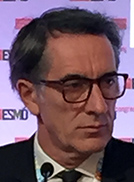Adjuvant sunitinib prolongs the disease free survival of patients with locoregional clear-cell renal cell carcinoma
Results of a phase III study demonstrate that adjuvant therapy with sunitinib prolongs the disease free survival (DFS) in patients with locoregional clear-cell renal cell carcinoma (RCC).1 These findings are in contrast with the results of the phase III ASSURE trial, in which adjuvant sorafenib or sunitinib did not results in a longer DFS, or overall survival (OS) in post-nephrectomy patients with locoregional RCC.2 As such, a positive survival signal, or a positive meta-analysis for DFS including both data sets, would be needed in order to recommend sunitinib as adjuvant therapy in this setting.
The recurrence rate of kidney cancer after nephrectomy, where part or all of a kidney is removed, is up to 50% in some subgroups of patients. This distinguishes RCC from other tumors such as breast cancer where the recurrence rate after a complete resection is relatively low. Over the past decade, several new effective drugs entered the treatment arsenal for RCC in the metastatic setting, but currently there is no effective standard adjuvant treatment for patients with loco-regional RCC, who underwent a nephrectomy.
The presented phase III trial evaluated the ability of adjuvant treatment with sunitinib to improve the DFS in 615 post-nephrectomy patients with clear-cell RCC. Patients in the study were randomized to placebo or sunitinib for one year. Sunitinib was administered at 50 mg per day in a four weeks on / two weeks off schedule. One dose reduction to 37.5 mg per day was allowed. Patients were treated for 1 year, or until disease recurrence, occurrence of secondary malignancy, significant toxicity, or consent withdrawal. Patients with suspected metastases in an independent central review were excluded from the study. The primary endpoint of the trial was DFS, assessed by an independent central review committee of radiologists.
The study met its primary endpoint with a significantly longer DFS of 6.8 years with sunitinib as compared to 5.6 years with placebo (HR[95%CI]: 0.76[0.594-0.975]; p= 0.030). After 3 years of follow-up, 64.9% of patients treated with adjuvant sunitinib was still disease-free as compared to 59.5% in the placebo treated population. After 5-years, 59.3% of patients on adjuvant sunitinib was free of disease vs. 51.3% for placebo-treated patients.
Adverse events of grade 3 or higher were more frequent with sunitinib (62.1%) as compared to placebo (21.1%). However, the incidence of serious adverse events was similar in both arms (21.9% with sunitinib vs. 17.1% with placebo). Importantly, no deaths occurred due to treatment toxicity.
In summary, these DFS data suggest that sunitinib is a potential new option for adjuvant therapy in renal cell carcinoma. Moreover, the treatment was relatively well tolerated, with a manageable safety profile. As mentioned before, these results are in contrast with the results of the ASSURE study, where no benefit of adjuvant sorafenib, or sunitinib was found. In this light, the investigators underlined that in this study, predominantly clear-cell RCC patients without metastases and at high risk of recurrence were included. Moreover, sunitinib was used at a starting dose of 50mg and a minimum dose of 37.5mg per day. This is a different patient population and another methodology than what is seen in ASSURE, which could in part explain the conflicting result. However, in order for adjuvant sunitinib to be incorporated in clinical practice, a positive survival signal, or a positive meta-analysis for DFS, would be needed, particularly when considering the toxicity of adjuvant sunitinib.
References
- Ravaud A, Motzer R, Pandha H, et al. Phase III trial of sunitinib (SU) vs placebo (PBO) as adjuvant treatment for high-risk renal cell carcinoma (RCC) after nephrectomy (S-TRAC). Presented at ESMO 2016; Abstract LBA11_PR.
- Haas N, Manola J, Uzzo R, et al. Initial results from ASSURE (E2805): Adjuvant sorafenib or sunitinib for unfavorable renal carcinoma, an ECOG-ACRIN-led, NCTN phase III trial. J Clin Oncol 33, 2015 (suppl 7; abstr 403).


